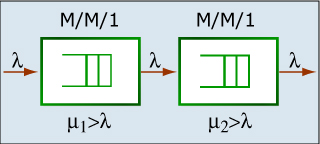Course Description
Discrete stochastic processes are essentially probabilistic systems that evolve in time via random changes occurring at discrete fixed or random intervals. This course aims to help students acquire both the mathematical principles and the intuition necessary to create, analyze, and understand insightful models for a …
Discrete stochastic processes are essentially probabilistic systems that evolve in time via random changes occurring at discrete fixed or random intervals. This course aims to help students acquire both the mathematical principles and the intuition necessary to create, analyze, and understand insightful models for a broad range of these processes. The range of areas for which discrete stochastic-process models are useful is constantly expanding, and includes many applications in engineering, physics, biology, operations research and finance.
Course Info
Instructor
Departments
Learning Resource Types
grading
Exams with Solutions
menu_book
Open Textbooks
theaters
Lecture Videos
assignment
Problem Sets
assignment_turned_in
Problem Set Solutions

Tandem queues: A stable M/M/1 queue has a Poisson output at the input rate. The next queue also has a Poisson output at that rate. (Image by MIT OpenCourseWare, adapted from Prof. Robert Gallager’s course notes.)










